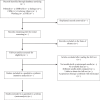Evidence for miniscalpel-needle/needle knife in the management of chronic pain related conditions: A protocol for systematic review and meta-analysis
- PMID: 31305481
- PMCID: PMC6641680
- DOI: 10.1097/MD.0000000000016474
Evidence for miniscalpel-needle/needle knife in the management of chronic pain related conditions: A protocol for systematic review and meta-analysis
Abstract
Objective: The aim of this systematic review with meta-analysis is to determine the effect of miniscalpel-needle/needle-knife in treatment of chronic pain symptoms.
Methods: The following electronic databases will be searched by 2 independent reviewers: PubMed, Cochrane Library, EMBASE, Springer, China National Knowledge Infrastructure (CNKI), Wanfang, and Chinese Biomedical Literature Database (CBM). All randomized controlled trials on miniscalpel-needle/need-knife for chronic pain published in electronic databases from inception to August 1, 2019 with language restricted in Chinses and English will be included in the study.Methodologic quality is assessed by 2 blinded reviewers independently screen and score the articles using the Physiotherapy Evidence Database (PEDro) scale and the Cochrane Collaboration risk of bias tool. A meta-analysis was performed when there is sufficient clinical homogeneity in at least 2 studies. The Grading of Recommendations Assessment, Development and Evaluation approach is used to rate the body of evidence in each meta-analysis. When the quantitive evaluation is not available, a qualitative description of the results of single study is provided.
Results: A high-quality synthesis of current evidence of miniscapel-needle/needle-knife treating chronic pain will be illustrated using subjective reports and objective measures of performance. The primary outcomes consisted of pain intensity improvement rate clinically meaningful improvements in pain and disability are also noted. Secondary outcomes involve the short form of McGill Pain Questionnaire score (SF-MPQ) and the side effects.
Conclusion: This protocol will present the evidence of whether miniscalpel-needle/needle-knife is an effective intervention for chronic pain.
Prospero registration number: CRD42019129076.
Conflict of interest statement
The authors have no conflicts of interest to disclose.
Figures
Similar articles
-
Acupuncture for ocular myasthenia gravis: A protocol for systematic review and meta-analysis.Medicine (Baltimore). 2020 Apr;99(17):e19901. doi: 10.1097/MD.0000000000019901. Medicine (Baltimore). 2020. PMID: 32332667 Free PMC article.
-
Effect of auriculotherapy on chronic low back pain: A protocol for systematic review and meta-analysis.Medicine (Baltimore). 2020 Apr;99(14):e19722. doi: 10.1097/MD.0000000000019722. Medicine (Baltimore). 2020. PMID: 32243410 Free PMC article.
-
Efficacy and safety of Chinese medicines for vitreous hemorrhage: A protocol for systematic review and meta-analysis.Medicine (Baltimore). 2020 May;99(19):e20086. doi: 10.1097/MD.0000000000020086. Medicine (Baltimore). 2020. PMID: 32384479 Free PMC article.
-
Effect of Scraping Therapy on Chronic Low Back Pain: A Systematic Review and Meta-analysis of Randomized Controlled Trials.J Manipulative Physiol Ther. 2021 Mar;44(3):255-270. doi: 10.1016/j.jmpt.2020.08.003. Epub 2021 Jan 9. J Manipulative Physiol Ther. 2021. PMID: 33436299
-
Effects of yoga on patients with chronic nonspecific neck pain: A PRISMA systematic review and meta-analysis.Medicine (Baltimore). 2019 Feb;98(8):e14649. doi: 10.1097/MD.0000000000014649. Medicine (Baltimore). 2019. PMID: 30813206 Free PMC article.
Cited by
-
Evidence for acupotomology in the management of cervical radiculopathy: A protocol for systematic review and meta-analysis.Medicine (Baltimore). 2020 Sep 4;99(36):e22007. doi: 10.1097/MD.0000000000022007. Medicine (Baltimore). 2020. PMID: 32899050 Free PMC article.
-
EEG alpha/beta features as a biomarker for quantifying pain in patients with lumbar disk herniation.Front Neurosci. 2025 Feb 11;19:1507245. doi: 10.3389/fnins.2025.1507245. eCollection 2025. Front Neurosci. 2025. PMID: 40012678 Free PMC article.
References
-
- Ma C, Wu S, Li G, et al. Comparison of miniscalpel-needle release, acupuncture needling, and stretching exercise to trigger point in myofascial pain syndrome. Clin J Pain 2010;26:251–7. - PubMed
-
- Chao M, Wu S, Yan T. The effect of miniscalpel-needle versus steroid injection for trigger thumb release. J Hand Surg Eur Vol 2009;34:522–5. - PubMed
-
- Tong, Peng, Yuanyuan, et al. Effect of miniscalpel-needle on relieving the pain of myofascial painsyndrome: a systematic review. J Tradit Chin Med 2015;35:613–9. - PubMed
MeSH terms
LinkOut - more resources
Full Text Sources
Medical


